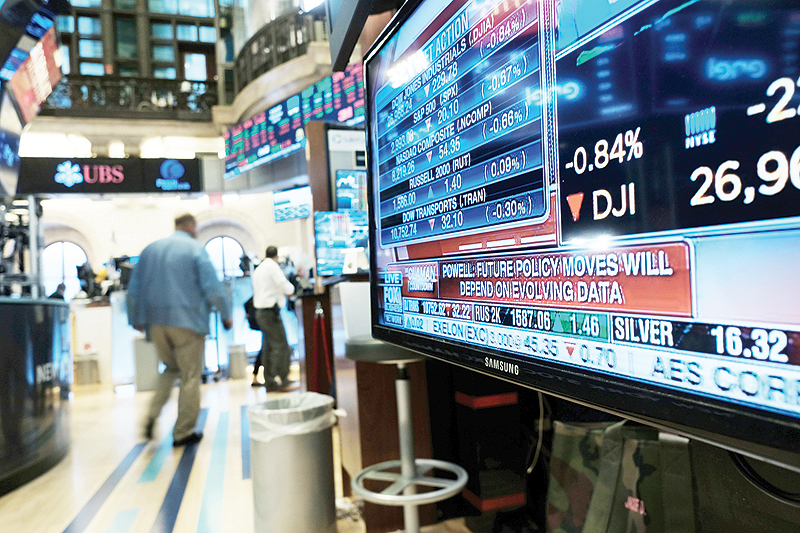Stocks blindsided as Powell rules out a long series of cuts
LONDON: The dollar pushed higher yesterday following the US Federal Reserve's first rate cut in more than a decade, but a lack of clear signals on future easing whipsawed equity markets. The move to ease the cost of borrowing had been well telegraphed and was meant to inoculate against global risks washing onto American shores.
Fed chair Jerome Powell said the US central bank decided on a 25-basis-point cut in the rate to "insure against downside risks from weak global growth and trade policy uncertainty". He told reporters he remains confident in the American economy and sees no sectors ready to go "bust". The Federal Reserve cut interest rates, but the head of the US central bank said the move might not be the start of a lengthy campaign to shore up the economy against risks including global weakness.
Powell cited signs of a global slowdown, simmering US trade tensions and a desire to boost too-low inflation in explaining the central bank's decision to lower borrowing costs for the first time since 2008 and move up plans to stop winnowing its massive bond holdings.
Some in the markets, as well as US President Donald Trump, thought the Fed might go for a bigger cut and signal that further easing was on the way, but Powell declined to commit to, or rule out, further cuts. Moreover, the decision to cut rates on Wednesday wasn't unanimous, with two members voting against.
"Investors quickly came to the conclusion that, with an 8-2 vote and a reluctance to commit to further cuts, the Fed was less dovish than they had believed," said analysts at Moneycorp.
"They marked down equity prices and took the US dollar higher." The Fed decision sent the US dollar rallying to its highest level in more than two years against the euro and the pound. On equity markets, Asian stock markets followed Wall Street lower.
European markets opened lower, but with weaker currencies good for export businesses, they pushed into positive territory as the morning wore on. The strong dollar made oil more expensive for customers in countries outside the United States, with the two main crude futures contracts losing more than 1.1 percent.
"Commodities should still see some support on easy money flowing throughout all the major central banks in the world," said OANDA Markets senior analyst Edward Moya.
"Let me be clear - it's not the beginning of a long series of rate cuts," Powell said in a news conference after the Fed released its latest policy statement. At the same time, he said, "I didn't say it's just one rate cut."
Financial markets had widely expected the Fed to reduce its key overnight lending rate by a quarter of a percentage point to a target range of 2.00 percent to 2.25 percent, but many traders expected clearer confirmation of forthcoming rate cuts.
US President Donald Trump, who has repeatedly attacked the Fed's policy stance under Powell and demanded that it push through big rate cuts, said on Twitter the Fed chief "let us down" by not telegraphing that an aggressive easing was coming.
US stock prices fell during Powell's news conference. The benchmark S&P 500 index closed down 1.1 percent for the day. Yields on 2-year notes, a proxy for Fed policy rates, rose to 1.87 percent. Ken Polcari, managing principal at Butcher Joseph Asset Management, said Powell's message was "not what the market was expecting to hear" even though most traders expected a rate cut. "He is not shutting the door, but he is also not saying there is another one coming in September, so hold on," Polcari said. Heading into Wednesday's Fed decision, the S&P 500 was up about 3 percent since June 19, when the Fed first signaled a rate cut was likely as it pledged then to "act as appropriate to sustain" the record-long US expansion. In a statement at the end of a two-day policy meeting, the Fed said it decided to cut rates "in light of the implications of global developments for the economic outlook as well as muted inflation pressures." It said it will "continue to monitor" how incoming information affects the economy and that it will "act as appropriate to sustain" the expansion.
"It's smart of them to go ahead and take out some insurance here. It's better than none at all," said Brett Ewing, chief market strategist at First Franklin Financial Services in Tallahassee, Florida. - Agencies











